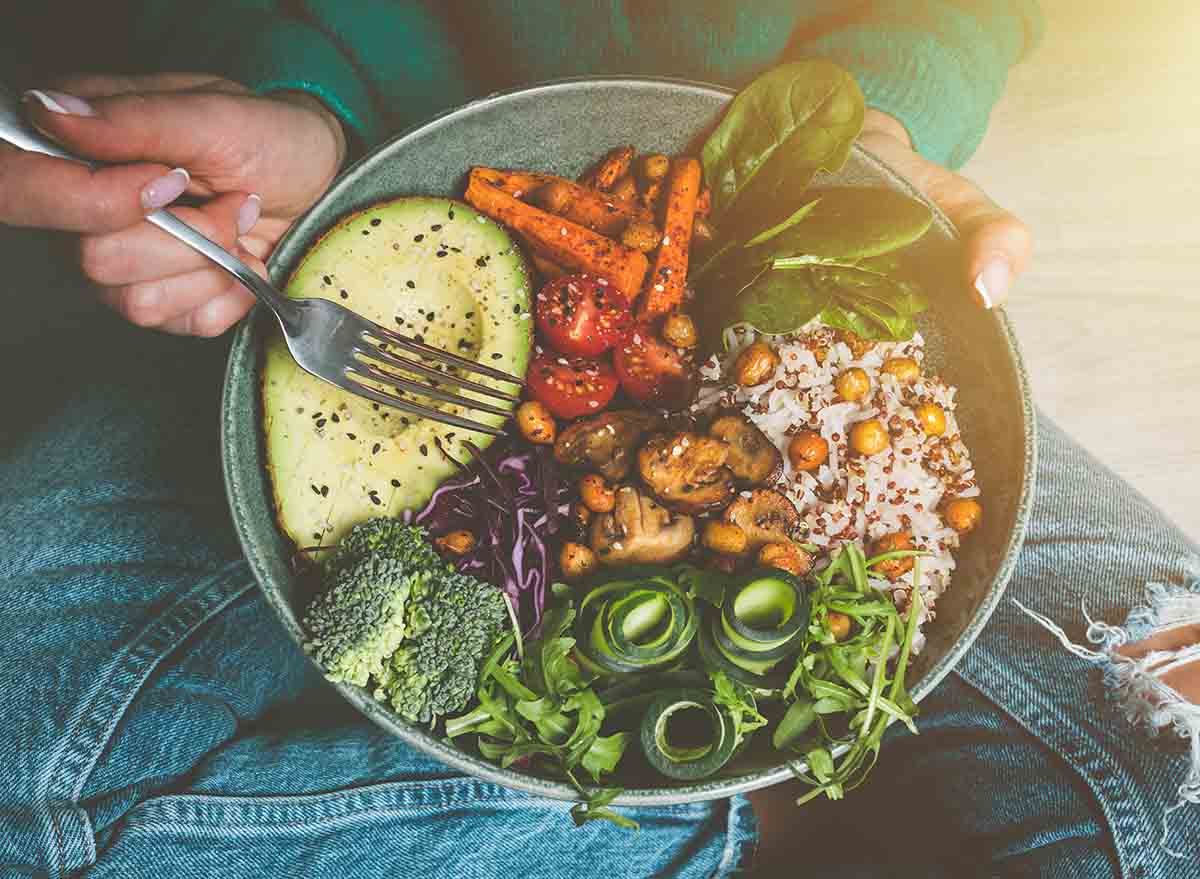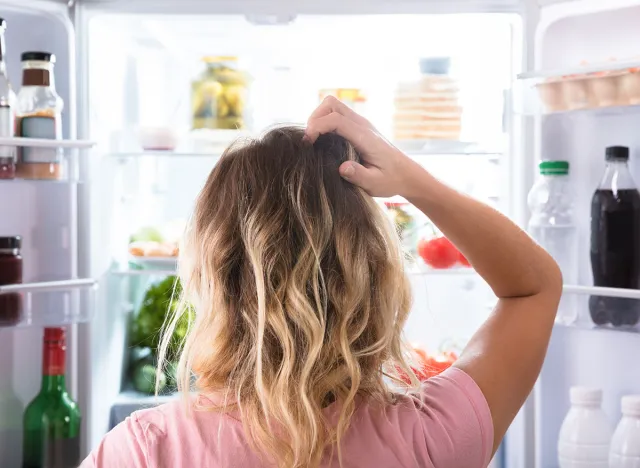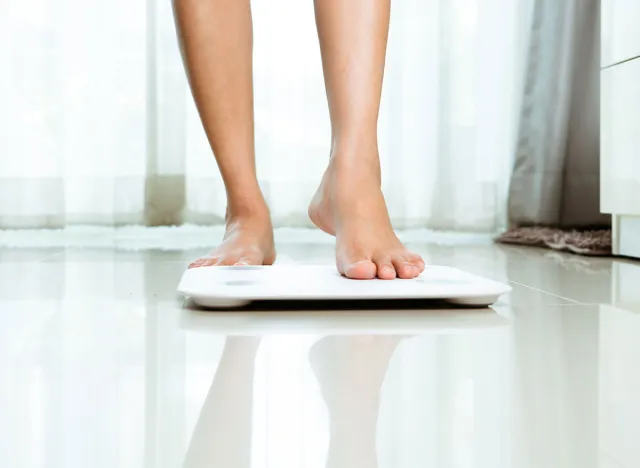10 Warning Signs You’re Not Eating Enough Fiber

Not to sound alarmist, but we have a fiber crisis on our hands. A 2021 study found that only seven percent of U.S. adults are getting enough fiber—a critical nutrient required for several aspects of your well-being, including digestive health, weight management, blood sugar control, and heart health, to name a few. According to the National Institutes of Health, the recommended daily fiber intake is 38 grams daily for men and 25 grams for women. However, the average American consumes only 14 grams a day on average. Now, you may be wondering: what are the signs you’re not eating enough fiber? To answer that exact question, we chatted with Destini Moody, RDN, CSSD, LD, a registered dietitian and sports dietitian with Garage Gym Reviews, who reveals 10 common signs that may indicate a lack of this essential nutrient.
Fiber comes in two main types: soluble and insoluble, and each type offers unique health benefits. Soluble fiber, found in foods like oats, beans, and fruits, dissolves in water to form a gel-like substance. This type of fiber helps lower cholesterol levels and stabilize blood sugar by slowing down the digestion and absorption of nutrients. Conversely, insoluble fiber, found in whole grains, nuts, and vegetables, doesn’t dissolve in water. Instead, it adds bulk to stool and helps support regular bowel movements to prevent constipation. Insoluble fiber also provides a feeling of fullness, which can help with weight management. A balanced intake of soluble and insoluble fiber is essential for good digestion and overall health.
Read on to discover the telltale signs you’re not eating enough fiber. And when you’re finished, be sure to check out these 23 Easy Weight-Loss Meal Prep Recipes.
You get drowsy after meals.

Research suggests fiber can prevent energy crashes by keeping blood sugar levels balanced. Therefore, feeling tired and lethargic after meals could mean you’re not getting enough fiber. “A fiber-rich meal causes the digestion of food to slow down, which means the glucose from the food enters your bloodstream more gradually,” Moody explains. “This prevents the blood sugar from spiking. Blood sugar spikes are accompanied by blood sugar crashes that usually end in lower blood sugar levels than before you ate. If you feel like you often need a nap after a carb-rich meal, it’s probably because you didn’t eat enough fiber.”
You’re constipated.
Fiber adds bulk to stool and aids in smooth bowel movements. Increasing your fiber intake through fruits, vegetables, legumes, and whole grains can be a game changer if you’re struggling with constipation. “One study showed that 77 percent of people dealing with constipation found relief by eating more fiber,” says Moody. “Insoluble fiber, like the type found in fruits and vegetables, acts as the digestive system’s “scrub brush” as it moves along the intestinal walls and keeps the contents of the gut moving. This prevents digested food from becoming stuck and causing constipation. Just drink enough water if you suddenly increase your fiber intake, as a lack of water to move the fiber through the digestive tract can have the opposite effect and make constipation worse.”
You have diarrhea or loose stools.
On the flip side, a sudden increase in fiber without sufficient hydration can lead to diarrhea. That’s why balancing your fiber intake with water consumption is crucial to keep your digestive system on track. “Not having enough fiber can also send you in the opposite direction with your bowel movements because fiber can add bulk to stools. This is especially true for soluble fiber, which can absorb fluids in the gut to form a gel-like substance. Since diarrhea is typically a result of too much water in the digestive tract, having soluble fiber in the gut to sponge up this excess fluid can help prevent loose stools.”
You can’t seem to satisfy your hunger.

Several studies have found that fiber can increase satiety and prevent overeating by adding volume to meals. However, constant hunger could signal you need to incorporate more fiber-rich foods into your diet. “When you consume a high-fiber meal, your stomach empties slower since fiber breaks down slowly,” explains Moody. “Fiber also expands as it absorbs water in the gut. Both of these functions help promote a feeling of fullness for longer. This is why if you swapped out your white rice for the same amount of brown rice, though the calories and portions are the same, you would likely feel more full from brown rice.”
Your LDL-cholesterol is high.
If your LDL (or “bad”) cholesterol is elevated, it could mean you need more fiber. According to a 2019 study, high LDL cholesterol levels are linked to low-fiber diets. “Though the effect that fiber has on cholesterol is modest, it does have a positive effect compared to those who consume less fiber. By combining soluble fiber such as oats with other lifestyle changes such as exercise, adding soluble fiber like oats to your diet has been shown to help lower LDL cholesterol,” says Moody.
You feel sluggish.
Fiber-rich foods provide a steady release of energy, helping reduce fatigue and keep you satiated. “Most of the fiber in our diet comes from whole grains, fruits, and vegetables. These foods also contain antioxidants you can’t find in meat and dairy. Fiber intake is great, but the antioxidants in fiber-containing foods also battle chronic inflammation in the body. It’s also why people who suddenly start eating more fruits and vegetables report feeling better. So, if you’ve been experiencing fatigue or tiredness that doesn’t make sense, try eating more high-fiber foods.”
You’re gaining weight and don’t know why.

Research points out that low fiber intake is associated with being overweight. That’s because foods high in fiber tend to be fruits, veggies, legumes, and whole grains, which are lower in calories than meat and dairy. Eating fiber-rich foods can help you lose weight by filling you up without consuming excess calories. “If you’re constantly experiencing blood sugar crashes due to a lack of fiber to slow down digestion, you might find yourself snacking more without even realizing it,” says Moody. “This can cause an insidious overconsumption of calories, leading to weight gain that seems to come out of nowhere. This is especially true if you exercise often, as exercise can increase your hunger. This can cause one to assume their unusual increase in appetite is due to being more active, rather than a lack of fiber.”
You’re bloated.
“When gut health is poor, the bad bacteria can ferment in the gut and produce gasses that cause bloating and stomach discomfort,” Moody explains. “This is where fiber comes in. Many types of fiber can act as a prebiotic, a type of fiber that acts as food for the beneficial bacteria in our gut. Prebiotics are great for gut health as this “feed” for the microbiome allows the good bacteria to grow and multiply, thus improving our gut health.”
You’re deficient in certain vitamins.
A diet low in fiber may indicate an insufficient intake of essential vitamins found in fruits, vegetables, and whole grains. “Many fiber-containing foods are rich in key nutrients. For example, sweet potatoes and carrots are high in vitamin A, while oats and spinach are high in magnesium. If you have a diet of poor nutritional quality and don’t eat enough of these foods, you may find you aren’t getting enough of these vitamins and minerals,” says Moody.
You have hemorrhoids.
Fiber adds bulk to stool, which improves motility and reduces your hemorrhoid risk, according to a 2021 study. “You may have hemorrhoids if you don’t consume enough fiber,” warns Moody. “Hard stools make it much more difficult to have a smooth bowel movement, which can cause straining during bathroom breaks, which, in turn, causes hemorrhoids. Insoluble fiber like those found in non-starchy fruits and vegetables acts to soften stool and prevent the need for straining.”
- Source: Staff, A. (2021, June 9). Most Americans are not getting enough fiber in our diets. American Society for Nutrition. https://nutrition.org/most-americans-are-not-getting-enough-fiber-in-our-diets/
- Source: Rough up your diet. (2019, July 24). NIH News in Health. https://newsinhealth.nih.gov/2010/08/rough-up-your-diet
- Source: Khalid, W., Arshad, M. S., Jabeen, A., Muhammad Anjum, F., Qaisrani, T. B., & Suleria, H. A. R. (2022). Fiber-enriched botanicals: A therapeutic tool against certain metabolic ailments. Food science & nutrition, 10(10), 3203–3218. https://doi.org/10.1002/fsn3.2920
- Source: Akbar A, Shreenath AP. High Fiber Diet. [Updated 2023 May 1]. In: StatPearls [Internet]. Treasure Island (FL): StatPearls Publishing; 2024 Jan-. Available from: https://www.ncbi.nlm.nih.gov/books/NBK559033/
- Source: O'Reilly, G. A., Belcher, B. R., Davis, J. N., Martinez, L. T., Huh, J., Antunez-Castillo, L., Weigensberg, M., Goran, M. I., & Spruijt-Metz, D. (2015). Effects of high-sugar and high-fiber meals on physical activity behaviors in Latino and African American adolescents. Obesity (Silver Spring, Md.), 23(9), 1886–1894. https://doi.org/10.1002/oby.21169
- Source: Christodoulides, S., Dimidi, E., Fragkos, K. C., Farmer, A. D., Whelan, K., & Scott, S. M. (2016). Systematic review with meta-analysis: effect of fibre supplementation on chronic idiopathic constipation in adults. Alimentary pharmacology & therapeutics, 44(2), 103–116. https://doi.org/10.1111/apt.13662
- Source: Wu, S., Jia, W., He, H., Yin, J., Xu, H., He, C., Zhang, Q., Peng, Y., & Cheng, R. (2023). A New Dietary Fiber Can Enhance Satiety and Reduce Postprandial Blood Glucose in Healthy Adults: A Randomized Cross-Over Trial. Nutrients, 15(21), 4569. https://doi.org/10.3390/nu15214569
- Source: Soliman G. A. (2019). Dietary Fiber, Atherosclerosis, and Cardiovascular Disease. Nutrients, 11(5), 1155. https://doi.org/10.3390/nu11051155
- Source: Hadrévi, J., Søgaard, K., & Christensen, J. R. (2017). Dietary Fiber Intake among Normal-Weight and Overweight Female Health Care Workers: An Exploratory Nested Case-Control Study within FINALE-Health. Journal of nutrition and metabolism, 2017, 1096015. https://doi.org/10.1155/2017/1096015
- Source: De Marco, S., & Tiso, D. (2021). Lifestyle and Risk Factors in Hemorrhoidal Disease. Frontiers in surgery, 8, 729166. https://doi.org/10.3389/fsurg.2021.729166









